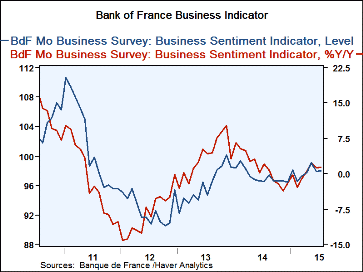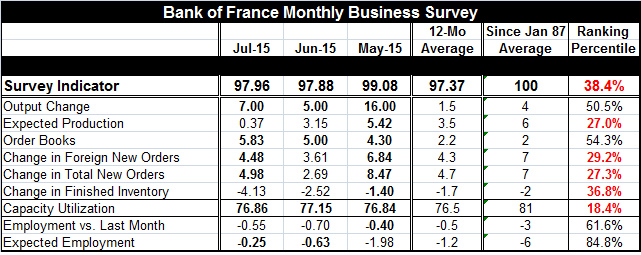 Global| Aug 10 2015
Global| Aug 10 2015Bank of France Survey: France Continues to Struggle
Summary
France's business survey by the Bank of France ticked higher in July; however, remaining off its recent peak. The index edged up to 97.96 from June's 97.88, still below May's 99.08 reading. The July reading is slightly above its [...]
 France's business survey by the Bank of France ticked higher in July; however, remaining off its recent peak. The index edged up to 97.96 from June's 97.88, still below May's 99.08 reading.
France's business survey by the Bank of France ticked higher in July; however, remaining off its recent peak. The index edged up to 97.96 from June's 97.88, still below May's 99.08 reading.
The July reading is slightly above its 12-month average but below its average reading of 100. The most telling statistic of weakness in the Bank of France (BOF) indicator is its rank percentile standing which is at the 38.4% percentile mark of its historic queue of values. This index is weaker only 38% of the time and stronger 62% of the time; that is not an impressive mark.
The most upbeat aspects of the index this month are the level of expected employment and the assessment of employment last month. The former has a strong reading at the 84th percentile, the latter at the 61st percentile. Both of these readings improved in July, but both still have outright negative diffusion values.
Order books have a 54th percentile reading in July and the output change has a 50.5 percentile standing. This completes the list of readings with standings at or above their 50th percentile; the 50th percentile occurs at the median value by construction of these indices.
While order books overall had a 54th percentile standing, the change in foreign and domestic orders each have standings below their respective 30th percentiles - a very weak level. Capacity utilization at 76.86 stands in the lower 18th percentile of its historic range. Expected production fell sharply in July from 3.15 to 0.37 and to a 27th percentile standing.
These metrics for France are very disappointing. France is not building a head of steam toward a better recovery. The economy is continuing to struggle. As the second largest economy in the euro area, it is a drag on the evolution of growth in the region.
While France continues to underperform, much of the attention these days is focused on Greece where the weekend news is that Germany and Greece are hammering out a new deal. However, a second set of reports announces the pessimism of the Finns who may even opt out of the next bailout package with Greece. There is no word on how or if a bailout deal is possible without the inclusion of the IMF which requires debt forgiveness as the price of its participation. Of course, there has been no word on debt forgiveness.
It is fair to say that Europe remains in a tizzy over Greece and that Greece has absorbed far too much of the area lenders' time as even the better-performing countries in the euro area still have a lot of work to do for themselves. France is an example of that. French leaders' time would be better spent working out France's problems than trying to help Greece.

Robert Brusca
AuthorMore in Author Profile »Robert A. Brusca is Chief Economist of Fact and Opinion Economics, a consulting firm he founded in Manhattan. He has been an economist on Wall Street for over 25 years. He has visited central banking and large institutional clients in over 30 countries in his career as an economist. Mr. Brusca was a Divisional Research Chief at the Federal Reserve Bank of NY (Chief of the International Financial markets Division), a Fed Watcher at Irving Trust and Chief Economist at Nikko Securities International. He is widely quoted and appears in various media. Mr. Brusca holds an MA and Ph.D. in economics from Michigan State University and a BA in Economics from the University of Michigan. His research pursues his strong interests in non aligned policy economics as well as international economics. FAO Economics’ research targets investors to assist them in making better investment decisions in stocks, bonds and in a variety of international assets. The company does not manage money and has no conflicts in giving economic advice.






